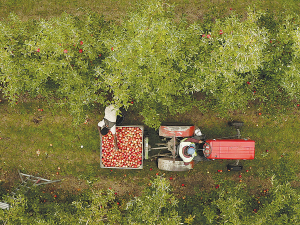NZ and Chile Sign New Agricultural Cooperation Deal
New Zealand and Chile have signed a new arrangement designed to boost agricultural cooperation and drive sector success.
 A new report shows that the apples and pears sector contributed $1.96b of total revenue impact to New Zealand’s economy in 2023.
A new report shows that the apples and pears sector contributed $1.96b of total revenue impact to New Zealand’s economy in 2023.
For the primary sector, 2024 would go down as one of the toughest years on record. Peter Burke reports.
While the year started with a new farmer-friendly coalition Government in office, the rural sector - and indeed the whole country - was overwhelmed by high interest rates, rising inflation and record input costs.
Commentators oozed pessimism while farmers clung onto the belief that their old mate, the National Party, would deliver better times. The promise of reducing the power of Wellington bureaucrats, bringing back live animal exports and undoing the plethora of regulations imposed by the previous government remains a work in progress.
The Government, to their credit, did however tick a few boxes: initiating an inquiry into banking, disbanding He Waka Eke Noa, canning regulations for intensive winter grazing and stock exclusions, and pausing the rollout of Freshwater Farm Plans.
On the geopolitical front there were challenges aplenty with the realisation that the golden era of international trade is over, thus making it nigh impossible for NZ to now secure the pretty amazing FTAs it got with the UK and the EU. Wars in the Middle East and Ukraine added to the chaos and uncertainty.
But by the end of the year, the light at the end of the tunnel grew and by December things are looking much brighter for a sector that has really been through the mill.
The New Government
The coalition came bearing gifts to farmers with their onslaught on the tsunami of regulations that had plagued the rural sector. Agriculture Minister Todd McClay ably led the large team of new ministers appointed to various roles in the coalition. Mark Patterson, Andrew Hoggard and Nicola Grigg quickly came to grips with their respective portfolios. As far as the opposition were concerned, they were virtually unsighted in the agri-space throughout the year.
Live Animal Exports
The coalition indicated early on they would abolish the ban imposed by Labour on the exports of live animals by sea. Andrew Hoggard led the charge, shrugging off widespread opposition to the proposal, including a 50,000-signature petition.
Slashing Regulations
One of the new Government's most successful ministers, Chris Bishop began reforming key pieces of legislation, including the controversial RMA and pausing the introduction of others, including freshwater farm plans. The latter has been described by one farmer as a bureaucratic bird's nest. The reforms are seen as music to the ears of the primary sector.
Land use also came under scrutiny with the Government signalling a new law to limit productive farmland being converted to forestry. Commercial growers remain fearful of productive land being gobbled up by urban sprawl. One of the reasons given for the recent closing of the Smithfield freezing works in Timaru was a lack of stock caused by such land change.
Another big issue was the removal of agriculture from the emissions trading scheme.
Trade Deals
New Minister of Agriculture and Trade Todd McClay clocked up the air miles throughout the year to deliver on the promise of securing new trade deals, which he did in terms of the UAE and later the Gulf Cooperation Council (GCC), made up of six of the world's richest countries: Bahrain, Kuwait, Oman, Qatar, Saudi Arabia, and the United Arab Emirates (UAE) - all lucrative markets for NZ.
Science Scores Well
Ag-science tends to happen quietly behind the scenes and 2024 was no exception. Big news was the landmark application by AgResearch to apply to use gene editing that could lead to the development of a species of ryegrass that offers better protection from pests and has no harmful effects on animals.
Another major development was the successful work that MPI has done to eradicate Mycoplasma bovis. Also, a shout out to the work of Massey and Lincoln universities for the field days they have run during the year. Of special note is Massey's trial to get quality data on the self-shedding Wiltshire sheep.
Disaster Hangover
Farmers and growers - especially those in Hawke's Bay and Tairawhiti - are still in recovery mode following Cyclone Gabrielle. What has angered the Mayor of Wairoa, Craig Little, most has been the lack of progress in repairing the section of SH2 between Napier and his town. He told Rural News that he was 100% frustrated with the transport agency NZTA for failing to deal with the repairs to the road.
 |
|---|
|
Trade and Agriculture Minister Todd McClay has been leading a team of ministers to make life easier for farmers. |
China
If there was one word that dominated conversations in the dairy and red meat sectors, it was China. International economic problems there have led to a slower recovery than expected and consumers are being cautious with their purchases.
As the year ended, the MIA, supported by B+LNZ and the Government, launched a major initiative in China to retain and increase NZ's meat exports there.
Dairy
It's been a rollercoaster year for the country's 11,000 dairy herd owners and workers.
The year started with many farmers struggling to make a profit, thanks to high input costs and interest rates. However, by the end of the year, the mood in milking sheds had changed. The 2024-25 season milk price will be the highest on record and a double-digit payout is on the cards.
For many dairy farmers, reducing debt, clearing overdrafts and carrying out much-needed repairs to on farm infrastructure will now start in earnest. 2025 will be a big year for Fonterra as farmer shareholders vote on the sale of its consumer businesses in NZ, Australia and Sri Lanka. The potential sale could fetch $3.5 billion and farmer shareholders and unit holders could be in line for a bumper capital return.
DairyNZ
The farmer lobby board elected its first woman chair. Tracy Brown of Matamata has a great track record working with farmers and is popular with farmers. DairyNZ's new chief executive, Campbell Parker, Brown and her board are working hard to erase an operating deficit at the industry-good body.
Horticulture
The news for horticulture was positive after two awful years dominated by the impacts of a series of adverse weather events. Zespri delivered a record 190 million trays to its more than 50 markets. Fruit quality was the best it's been for five years and returns to growers were also good. It was a huge season in China for the sector with the volume of fruit delivered there up 40% on last year. Europe and the USA also delivered good returns.
The outlook for the coming season is also looking positive.
For the apple sector, conditions over the past four years haven't been ideal with growers struggling to access labour due to Covid-19 border closures, and Cyclone Gabrielle decimating the 2023 crop. As a result, industry revenue has declined by around 0.5% per year from 2020 to 2023. However, things are looking up and a new report shows that the apples and pears sector employs more than 12,000 permanent and seasonal employees and contributed $1.96b of total revenue impact to New Zealand's economy in 2024.
HortNZ, the organisation that represents growers, this year acquired a new chief executive, Kate Scott. While she has pledged to listen, learn and lead in her first year in the job, she is also very focused on getting 'regulatory consistency' for the sector - something that is sadly lacking.
What's In Store For 2025?
It's the 'doing year' for the new coalition, so watch for that tsunami of deregulation and new farmer-friendly legislation, and pressure on local government to get its act together and work more positively with rural communities.
Also, resumption of live animal exports by sea and more moves on the gene editing front are likely.
Trade will be high on the agenda with Todd McClay probably spending more time out of the country than in it to secure better access for our primary exports. The meat industry will be battling to retain its place in the Chinese market, but the dairy and hort sectors look to continue to bounce back.
In a world dominated by geopolitical uncertainty and climate change, be prepared to expect the unexpected.
New Zealand and Chile have signed a new arrangement designed to boost agricultural cooperation and drive sector success.
New DairyNZ research will help farmers mitigate the impacts of heat stress on herds in high-risk regions of the country.
Budou are being picked now in Bridge Pā, the most intense and exciting time of the year for the Greencollar team – and the harvest of the finest eating grapes is weeks earlier than expected.
The Real Estate Institute of New Zealand (REINZ) has released its latest rural property report, providing a detailed view of New Zealand’s rural real estate market for the 12 months ending December 2025.
Rural retailer Farmlands has released it's latest round of half-year results, labeling it as evidence that its five-year strategy is delivering on financial performance and better value for members.
OPINION: "We are back to where we were a year ago," according to a leading banking analyst in the UK, referring to US president Donald Trump's latest imposition of a global 10% tariff on all exports into the US.

OPINION: A mate of yours truly reckons rural Manawatu families are the latest to suffer under what he calls the…
OPINION: If old Winston Peters thinks building trade relations with new nations, such as India, isn't a necessary investment in…